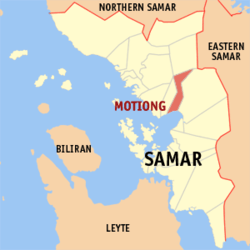Motiong, Samar
| Motiong Mutya | |
|---|---|
| Municipality | |
|
Sadukan Festival of the Municipality of Motiong | |
 Map of Samar with Motiong highlighted | |
.svg.png) Motiong Location within the Philippines | |
| Coordinates: 11°47′N 125°00′E / 11.783°N 125.000°ECoordinates: 11°47′N 125°00′E / 11.783°N 125.000°E | |
| Country | Philippines |
| Region | Eastern Visayas (Region VIII) |
| Province | Samar |
| Congr. district | 2nd district of Samar |
| Established | 1948 |
| Barangays | 30 |
| Government[1] | |
| • Mayor | Francisco M. Langi Sr. |
| Area[2] | |
| • Total | 174.40 km2 (67.34 sq mi) |
| Population (2010)[3] | |
| • Total | 14,829 |
| • Density | 85/km2 (220/sq mi) |
| Time zone | PST (UTC+8) |
| ZIP code | 6702 |
| Dialing code | 55 |
Motiong is a fourth class municipality in the province of Samar, Philippines. According to the 2010 census, it has a population of 14,829 people.[3]
Barangays
Motiong is politically subdivided into 30 barangays namely as follows:[2]
- Poblacion I
- Poblacion I-A
- Angyap
- Barayong
- Bayog
- Beri
- Bonga
- Calantawan
- Calapi
- Caluyahan
- Canatuan
- Candomacol
- Canvais
- Capaysagan
- Caranas
- Caulayanan
- Hinica-an
- Inalad
- Linonoban
- Malobago
- Malonoy
- Mararangsi
- Maypange
- New Minarog
- Oyandic
- Pamamasan
- San Andres
- Santo Niño
- Sarao
- Pusongan
History
Long before the coming of the Americans, there were already local folks inhabited in Motiong, wherein the place was unnamed at that time.
Some of these people went on sea diving to gather oyster for their daily consumption and the rest barter goods such as rice, corn, cassava, taro, yam tubers, sea foods and abaca fibers to other neighboring barrios and municipalities. There were only few local caravans who are traveling in groups aided in defense against bandits as well as helped to improve economies of scale in trade although, only few people have the means to buy commodities.
One man tried to open one oyster and with great astonishment, he found a lustrous pearl where he called “Mutya”. Believing that the place was full of treasure, the settlers started to name the place “Mutya” which to means “Land of Treasure”.
Mariano Sapetin, Valentin Conge, Simon Tingzon Sr., Claudio Tingzon and Antonio Abalos were few people who persuaded to make Motiong an independent town. The reward of their effort was the House Bill No. 1844 by Congressman Tito V. Tizon which was approved as Republic Act No. 290 on June 16, 1948. It separated into another town the barrios of Motiong, Bayog, Uyandic, Calantawan, Sinampigan, Calape, Bonga, Hinicaan, Caluyahan, Malolobog, and Maypangi, formerly part of the town of Wright.[4] Mariano Sapetin and Antonio Uy were appointed as first mayor and vice-mayor respectively.
Demographics
| Population census of Motiong | ||
|---|---|---|
| Year | Pop. | ±% p.a. |
| 1990 | 12,115 | — |
| 1995 | 13,177 | +1.59% |
| 2000 | 13,147 | −0.05% |
| 2007 | 13,549 | +0.42% |
| 2010 | 14,829 | +3.34% |
| Source: National Statistics Office[3][5] | ||
References
- ↑ "Municipalities". Quezon City, Philippines: Department of the Interior and Local Government. Retrieved 15 May 2013.
- 1 2 "Province: Samar (Western Samar)". PSGC Interactive. Makati City, Philippines: National Statistical Coordination Board. Retrieved 15 May 2013.
- 1 2 3 "Total Population by Province, City, Municipality and Barangay: as of May 1, 2010" (PDF). 2010 Census of Population and Housing. National Statistics Office. Retrieved 15 May 2013.
- ↑ "An act creating the municipality of Motiong, province of Samar". LawPH.com. Retrieved 2011-04-09.
- ↑ "Province of Western Samar". Municipality Population Data. LWUA Research Division. Retrieved 21 August 2013.
External links
- Philippine Standard Geographic Code
- Philippine Census Information
- Local Governance Performance Management System
 |
San Jose de Buan |  | ||
| Jiabong | |
Paranas | ||
| ||||
| | ||||
| Maqueda Bay San Sebastian |
